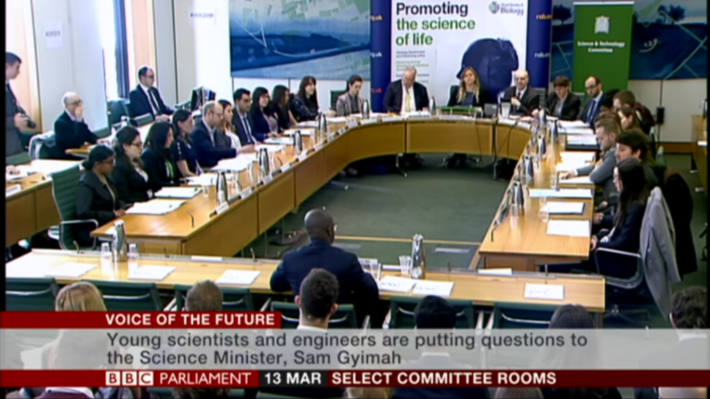BES Members Quiz Politicians at Voice of the Future 2018
Abi Gazzard is a BES member and PhD student at the University of Reading. She recently participated in Voice of the Future 2018; an event where young scientists and engineers get to ask political figures important science policy questions in the Houses of Parliament.

Last week, amongst a very busy timetable at the Houses of Parliament, young scientists gathered at Portcullis House to attend the Voice of the Future 2018. It’s not every day that you get to put forward questions to key figures involved in science policy (including Ministers, members of the Science and Technology Select Committee and the Government Office for Science) – this is the opportunity that is given to early-career researchers at the annual event organised by the Royal Society of Biology (RSB). Over 20 scientific societies as well as 2 secondary schools were represented at the Voice of the Future 2018, and I was lucky enough to be one of the researchers there on behalf of the British Ecological Society.
The event is a completely unique experience and as Dr Stephen Benn of the RSB put it, “there is probably no other event like this in the world”! In the room where Select Committees normally meet to question witnesses and gather evidence, the tables were turned so that the scientists sat around the horseshoe whilst the political figures took up the hot seats.
“there is probably no other event like this in the world”
Question time
The questions had been pre-selected from over 400 suggestions which, unsurprisingly, had mostly related to Brexit. On the day, however, we had a much more even spread of topics that ranged from postdoc positions to plastic pollution.
First to have their brain picked was Sam Gyimah MP, Minister of State for Universities, Science, Research and Innovation – I was lucky enough to have been allocated a question during this panel. My question had been submitted by another scientist and was about whether genetically altered crops should be given the green light in the UK. In short, Sam said that the government recognises the potential significance of gene-edited crops and believes that it should be facilitated where possible.
Next up was Chi Onwurah MP who is the Shadow Minister for Industrial Strategy, Science and Innovation. She received some great questions about career progression, the gender pay-gap and minority representation. Having an engineering background herself, Chi had a deep understanding of these issues and suggested many interesting solutions.
We then heard from the Science and Technology Committee which comprises numerous members of different political parties. The attending members represented the Conservative, Labour and SNP parties, so it was encouraging to hear similar and positive responses across the board when questioned about topics such as research funding post-Brexit and educating the next generation of scientists. Wrapping up the third panel session, an enjoyable question was posed by Wallington High School for Girls about how the world would react if we ever found evidence of life elsewhere in the universe. Martin Whitfield MP summed up his view by stating that if we discovered life elsewhere, “we’d certainly find how much we have in common with all life on this planet, and it might do us a huge amount of good”.
The final session was with Dr Rupert Lewis, who is the Director of the Government Office for Science. Dr Lewis raised some interesting points regarding plastic waste and proposed that we should encourage people and industry to look at waste as a resource.
“we’d certainly find how much we have in common with all life on this planet, and it might do us a huge amount of good”.
Bridging the gap
I had an insightful morning at the Voice of the Future 2018 and it was encouraging to see the extent to which politicians value science. It is clear, however, that there is still a gap to be bridged between science and policy – for instance, the vast majority of UK MPs lack backgrounds in STEM subjects. For that reason, I would definitely recommend this event to other early-career researchers as it is a great opportunity to learn more about how science and politics come together.
watch the full event on Parliament TV
Like what we stand for?
Support our mission and help develop the next generation of ecologists by donating to the British Ecological Society.